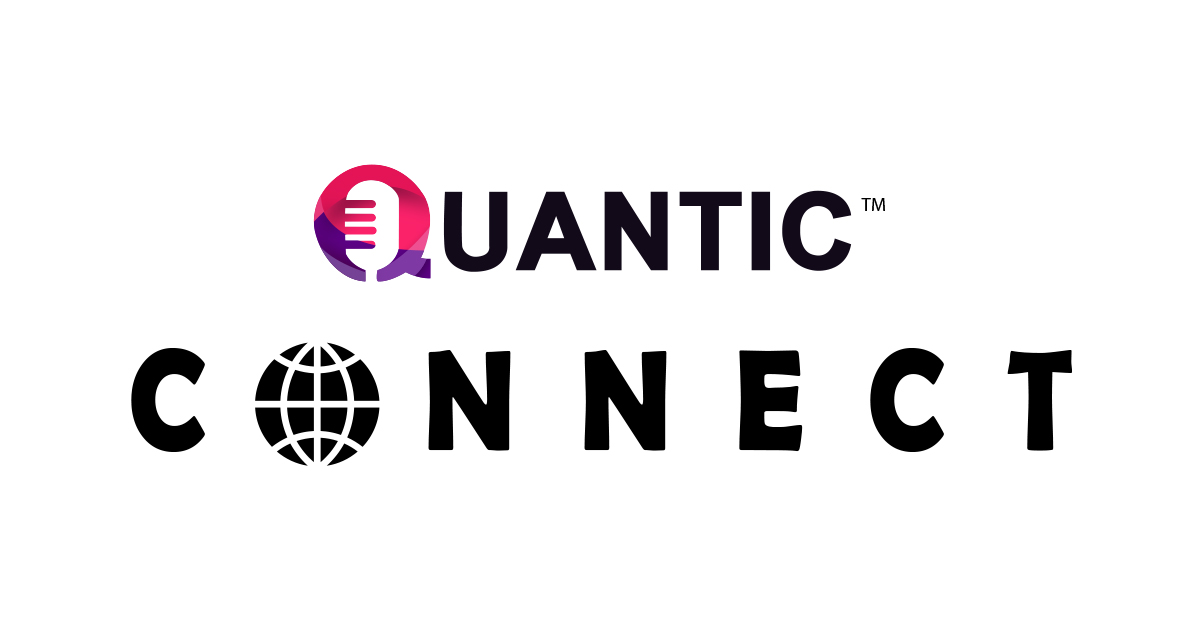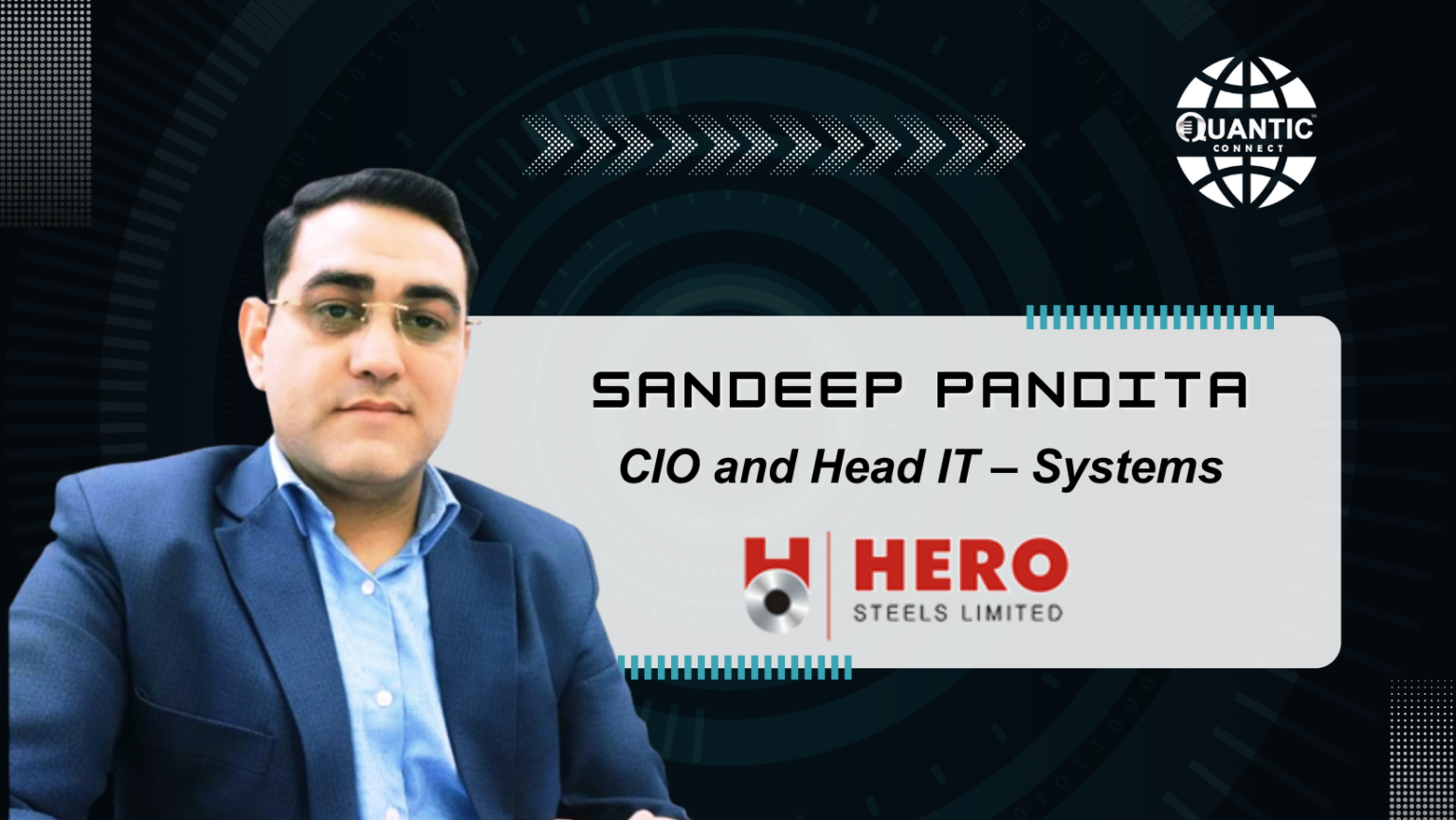Mumbai, 19th April: In the dynamic landscape of manufacturing, the quest for excellence relies on embracing data-driven practices. With the fusion of Artificial Intelligence (AI), Machine Learning (ML), and the Internet of Things (IoT), manufacturers have found a powerful ally in their pursuit of efficiency, innovation, and competitiveness. But the journey towards a data-driven culture is multifaceted, requiring a concerted effort across people, processes, and technology. Join us as we explore the pivotal role of AI, ML, and IoT in reshaping the manufacturing industry and paving the path towards a future where data reigns supreme.
Join Mr. Sandeep Pandita, CIO & Head IT – Systems at Hero Steels Limited in conversation with Mr. Marquis Fernandes, who spearheads the India Business at Quantic India, as they delve into how the manufacturing industry is embracing AI, ML, and IoT to revolutionize operations and drive unparalleled efficiency. From predictive maintenance to real-time monitoring, explore how these technologies are reshaping the landscape.
Mr. Sandeep Pandita is Head IT & Systems at Hero Steels Limited He is a seasoned information technology leader with over 17 years of diverse experience in IT Infrastructure Management, SAP, Digital Transformation, and application support across ITES and prominent industrial conglomerates. His expertise lies in strategically leveraging technology to drive business growth, ensuring that IT systems align with and contribute to the achievement of organizational objectives. Mr. Sandeep has a strong track record of successfully delivering complex projects spanning a wide range of technologies, from SAP S4/Hana to Artificial Intelligence and Machine Learning. He has held pivotal CIO and Head IT roles, reporting to top management and has received numerous prestigious IT awards, actively participating in various CIO communities.
In my previous article, I explored Digital literacy. And Today, I shift focus to another critical aspect of modern business leadership: cultivating a data-driven culture. As Chief Information Officers (CIOs), we stand at the forefront of this transformation, a journey that not only enhances current operations but also lays the groundwork for leveraging general AI effectively.
Addressing the data-driven predicament in manufacturing requires a holistic approach that encompasses technology, processes, and people. This may involve investing in advanced analytics tools, establishing data governance frameworks, fostering a culture of data-driven decision-making, and providing training and upskilling opportunities for employees. Additionally, collaboration with technology partners and leveraging industry best practices can help manufacturers navigate the challenges and unlock the full potential of their data.
As a CIO, you face a twofold challenge: ensuring data is centralized, accurate, and trusted, and making it easily accessible and consumable. This task is far from trivial and hinges on three pillars: people, process, and technology.
How can manufacturers leverage AI, ML, and IoT to build such a culture and thrive in the digital age?
In today’s rapidly evolving manufacturing landscape, data has emerged as the new currency driving innovation, efficiency, and competitiveness. With the proliferation of advanced technologies like Artificial Intelligence (AI), Machine Learning (ML), and the Internet of Things (IoT), manufacturers have unprecedented access to vast amounts of data. However, the true potential of this data can only be realized through the establishment of a robust data-driven culture.
- Need to understand the Foundation of Data-Driven Culture.
At its core, a data-driven culture is characterized by a pervasive reliance on data for decision-making at all levels of an organization. It encompasses not only the technological infrastructure necessary for data collection, storage, and analysis but also the mind-set and processes that prioritize data-driven insights over intuition or tradition.
And Strong processes are the backbone of rapidly scaling organizations. In the realm of data, processes ensure proper workflow, validation, and data integrity. While certifications like ISO and CMMI are valuable, the real success lies in cultivating a culture where processes are respected and adhered to, starting from the top.
- Technology: The Enabler of Data Accessibility
Technology plays a pivotal role in unifying data from diverse sources like ERPs, CRMs, and other systems into a centralized repository, be it a data warehouse or data lake. The challenge lies in selecting the right technology to build efficient data pipelines and ensuring data is accurately extracted, validated, transformed, and loaded.
Once centralized, the data can be presented through various user interfaces, from static reports to dynamic dashboards. The ultimate goal is to create an interactive data environment where leaders can query and receive insights instantly, akin to conversing with the data itself.
What is the role of AI, ML, and IoT in the manufacturing industry?
- AI in Manufacturing: Artificial Intelligence enables machines to perform tasks that typically require human intelligence, such as pattern recognition, prediction, and decision-making. In manufacturing, AI-powered systems can optimize production processes, predict equipment failures before they occur, and enhance product quality.
- ML for Predictive Maintenance: Machine Learning algorithms can analyse historical data from sensors embedded in machinery to predict when equipment is likely to fail. By implementing predictive maintenance strategies, manufacturers can minimize downtime, reduce maintenance costs, and extend the lifespan of their assets.
- IoT-enabled Smart Factories: The Internet of Things connects machines, devices, and sensors to collect real-time data from the factory floor. By harnessing IoT technology, manufacturers can monitor production processes in real-time, identify inefficiencies, and make data-driven adjustments to optimize performance.
- Building a Data-Driven Culture
- People: The Stewards and Consumers of Data:
The role of people in a data-driven culture is dual: data stewards and data consumers. Data stewards are responsible for maintaining the accuracy and integrity of departmental data. Often, individuals are unaware of their critical role in data stewardship. As CIOs, it’s our responsibility to identify, train, and empower these stewards, emphasizing the adage “garbage in, garbage out. Conversely, data consumers, typically function heads and top leaders, rely on this data for strategic decision-making. Ensuring they have easy access to reliable data is crucial for informed decision-making that shapes the organization’s future.
- Leadership Commitment:
Cultivating a data-driven culture starts at the top. Leadership must champion the value of data-driven decision-making and allocate resources to support the implementation of AI, ML, and IoT initiatives.
- Employee Training and Education:
Employees at all levels should receive training on how to collect, analyse, and interpret data effectively. This includes developing data literacy skills and fostering a mind-set that embraces experimentation and continuous learning.
- Data Governance Framework:
Establishing clear policies and procedures for data management, privacy, and security is essential for building trust in data-driven insights. A robust data governance framework ensures that data is accurate, accessible, and protected from unauthorized access or misuse.
- Collaborative Culture:
Break down silos between departments and encourage cross-functional collaboration. By sharing data and insights across teams, manufacturers can uncover new opportunities for process optimization and innovation.
- Iterative Improvement:
Embrace a culture of continuous improvement by using data to measure performance, identify areas for optimization, and experiment with new approaches. Encourage teams to iterate on ideas quickly and learn from both successes and failures.
In the manufacturing industry, harnessing the power of AI, ML, and IoT is not just about adopting new technologies—it’s about fostering a cultural shift towards data-driven decision-making. By embracing a data-driven culture, manufacturers can unlock new levels of efficiency, innovation, and competitiveness in an increasingly digital world. Through leadership commitment, employee empowerment, and the strategic implementation of technology, manufacturers can pave the way for a brighter future where data reigns supreme.
To know more about us / publish your article, reach us at
www.quanticindia.com
marquis@quanticindia.com.



